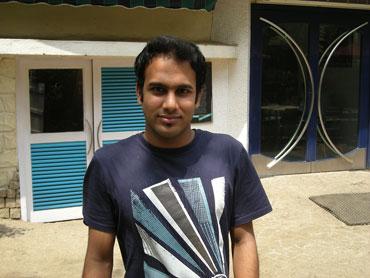
Abhinav Mehra walks in to a suburban Mumbai cafe dressed in a casual tee and a pair of jeans. He carries -- like most college kids his age -- a mobile phone, sports a goatee and a hairstyle what is presumably the latest trend in Mumbai colleges.
Unlike most of his classmates Mehra, a final year commerce student of HR College in Mumbai, is an entrepreneur. Last year Mehra started Ideation Incorporated a brand consultancy firm for start-ups. The company that was initially a summer project now has 16 clients that have their fingers in different pies.
The 21-year-old undergraduate entrepreneur tells Abhishek Mande his story:
Ideation Incorporated started as a summer project last year. I had a lot of time on hand and didn't know what to do with it. As part of Students in Free Enterprise. [SIFE is an international network of students, academicians and professionals that nurtures young students' passion for business and entrepreneurship] I decided to start a brand consultancy project to help out a bunch of fisherwomen who wanted to sell the paper bags they made to a larger market. Eventually, I also helped out the local sandwich wallah who was a laughing stock because of incorrect spellings on his menu card. I edited and redesigned it for him.
Two months into this, I realised I could make this into an endeavour. It did not need a lot of investment -- all I needed was a computer, which I had anyway -- and with some time and my networking skills, I knew I could do well. So around July last year, I set out.

I was aware that no big corporate houses would hire my services so I decided to target young start-ups. From housewives making chocolates to college girls doing crockery design, I handled all kinds of people and gave them ideas on how to take their business to the next level.
More often than not, this involves suggesting some very simple ideas like the one I gave a chocolatier -- to set up a temporary stall outside a popular cafe in her neighbourhood over a weekend. Much to her surprise she made a stupendous profit during those three days. I'd also suggested she make her presence felt on Facebook, from where she has got a dozen orders so far. Small things like these go a long way and not a lot of people think of them.
Why I turned down Google
When Google, KPMG and Ernst & Young came looking and offered me a job, I wasn't very sure I wanted to take up their offers simply because I would be doing the very same thing that some eight others are. I turned them down to continue with my enterprise. It gives me the freedom to do what I want. Tomorrow if I want to diversify, I can do it. Not only don't you lose that option once you join a company, you also don't have the adrenaline rush of starting something on your own.
My father was initially very apprehensive of my decision. He is a government servant and both my siblings are into proper jobs -- my brother is into clinical research and my sister is a stock analyst. My father is being transferred to Gurgaon, close to the Google office and he was keen I take up that offer. By then I was quite sure I wanted to do something on my own. No multinational can give me what my start-up had.

Challenges and learnings
My biggest learning since the time I started Ideation was that bulsh***ing can get you only that far. Someone approached me to design a template for a website offering me a lot of money in return. I am not very good at designing but I wanted to give it a try nonetheless. Later, when I sat down to do it, I realised it wasn't my cup of tea. I called him back and told him it wouldn't be possible. He appreciated my honesty. That day I lost a client but I knew I had lost him for the right reason. Once you are part of a big organisation you don't have that choice. You have to retain clients, get newer ones at whatever costs. I didn't want to do that.
Another learning at Ideation was when I walked into someone's office wearing a t-shirt and a pair of chappals. Weeks after our meeting, I hadn't heard from him. I called back and he told me I was too amateurish for a job like that. That day I realised that while it didn't make sense to walk into a meeting wearing a blazer, I do wear a decent shirt and trousers if not a well-ironed jeans and a pair of shoes.
One of my major challenges has been to get my clients to pay up! A lot of people don't always take me very seriously and don't pay up till I subtly nudge them. However lately, this attitude is changing as I have started becoming more assertive and professional in my meetings.
The other of course is the woe of most college kids -- there is never enough time for anything! The year that went by was quite something, as I had to balance my classes, work and extra-curricular activities. With college getting over soon I should get some breather. But in the last few months I learnt to multitask. Studies don't bog me down any more.
Future plans
Ideation Incorporated is just a stepping stone. It has taught me a lot and I plan to use this expereince further in my life. I plan to continue with Ideation Incorporated for some time before I take up something else. I am working on a few socially relevant projects -- the idea is to help out people but do it professionally and make a profitable working model out of it.
Eventually I plan to start up a venture capital firm because I am very good at networking and have the ability to look at things and see their viability.

Advice to young entrepreneurs and start-ups
Multitasking is also a quality that every young entrepreneur must possess. As a start-up you don't have the liberty to hire help and if you don't multitask, there is no way you can get ahead in life.
I understand the initial enthusiasm of a new start-up. But it is important to know your limits. Don't invest a lot of money in your start-up till you find your feet.
Don't be aggressive but be assertive -- that way your clients know you mean business.
Keep dreaming because if you don't there is really nothing left to do.
Build your brand. To do this you have to first understand your target audience. You must come across as being confident and precise about what you exactly do. Remember as a start-up, people will take you seriously only if you sell yourself well. This has nothing to do with how good you are or how brilliant your product is.
Learn to take up challenges -- if you think you can handle it, take it up.
And finally, start young. As one of my uncles told me there is no better time than now to start your enterprise. So go ahead and start that dream enterprise you always wanted to.